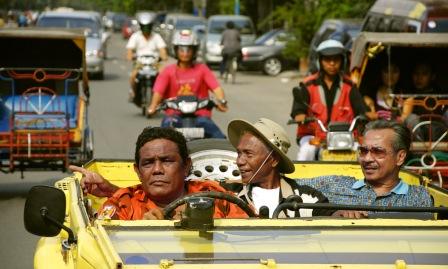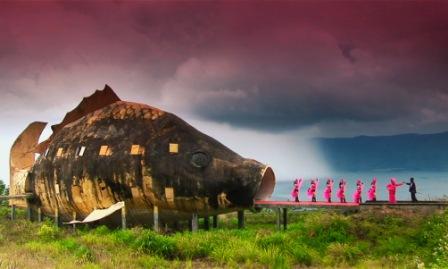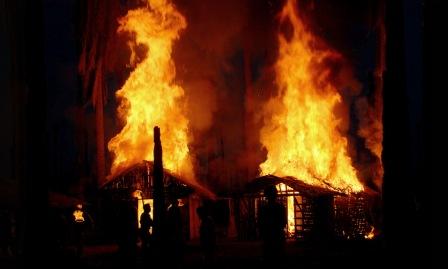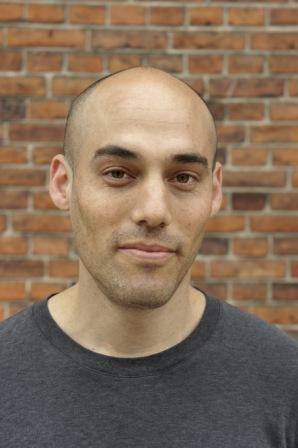"Imagine if forty years after the Holocaust, the Nazis were still in power and the henchmen are being interviewed about their crimes," director Joshua Oppenheimer told me here in New York, before the debut of his new film, Act of Killing. "There would be no shame for their crimes. This is what you have in my film. You have boasting instead."
The Act of Killing is a documentary about the death squad leaders responsible for the 1965 tortures and killings that in total took the lives of an estimated 2.5 million people in Indonesia under the Suharto regime. The henchmen are enthusiastic about sharing their crimes to the camera, to the point of pantomiming in detail how they used a sharp wire to strangle their victims. "A wire is better than a rope because the tendency for someone being strangled is to try to pull the cord off, and they can't grip a wire."
The film is the most powerful documentary I saw in the Thessaloniki film festival, where it screened last March. It has already won numerous awards in Europe, including the Audience Award at the Berlin Film Festival. It premieres tonight in New York.

The brilliance of the film lies in having the henchmen not only speak about their crimes, but re-enact them. Anwar Congo, the key henchman and "protagonist", is a jolly elderly man in cool yellow sneakers and sports car, whose favorite films are genre films, like Westerns and musicals. He and his buddies, including one pleasant chubby torturer named Herman, hence re-create their crimes in the style of these genres, with set lights and make-up to boot. Anwar is not only excited about the creative project, he is competitive. "The way we do killing is far more terrifying than even the Mafia gangster movies in New York."

A question is raised in the film about the relationship between media and violence. First, we have Anwar stylizing his sketches of actual torture after his favorite gangster movies. We also have, in a startling climax, Anwar on national Indonesian television, being cheered on by members of a paramilitary youth movement for using murder and terror to rid the country of dangerous elements: the so-called Communists. This shocking talk show program was actually inspired by The Act of Killing as a sort of a national press conference to promote Anwar's acts. Have Indonesians become so numb to killing that euphemisms are no longer necessary on public broadcast? Even the Nazis spoke of "final solutions".
"It's not that they are numb," Oppenheimer responded. "It's that the regime responsible for the killings still exists today, in different form. Remember, the Minister of Culture comes to cheer Anwar on [while he directs his "actors" to massacre a village]?" Today family members of leaders in the Suharto regime are still in positions of power.
The freedom to murder is assumed to be so acceptable that Anwar cheerfully has his own little grandchildren participate in his "genre" films, even though one child bursts into uncontrollable crying during the fake-murders.
Throughout this mad filmic journey into a reality where burning genitals is en par with having a cigarette with coffee, there are glimpses of humanity. One village woman, in the staged mass-murder scene, goes unconscious as soldiers fake-rape and kill; no one can revive her.

Even Anwar seems visibly upset when forced to act as one of his own victims, his face plied with gory make-up. By the end of the film, he confesses to having nightmares--and wonders how he will be treated in the afterlife, which is, given his advanced age, soon approaching.
"While making the film, I discovered there was something behind the boasting," Oppenheimer told me. "The boasting is a defense. If you have gotten away with your crimes, your tendency is to defend yourself or to boast." But behind the boasting, Oppenheimer says, is some sense of remorse. Anwar is a cog in the wheel of violence, pointing to the regime that created such a monster.
Oppenheimer is exceptionally informed about his topic. Unusual for a Western film director making a documentary in the East, Oppenheimer speaks the language of his subjects. He learned Indonesian while making his movie The Globalization Tapes in 2002, about unions in the palm oil plantation belt in the north of Indonesia. A doctoral student in experimental film making at St Martin's College, with a Bachelor's degree from Harvard, Oppenheimer had been commissioned to do this film when he was 26 years old, by the global trade union organization, the IUF. He also has academic training in the subject of violence and film, and has co-edited a book entitled Killer Images: Documentary Film, Memory and the Performance of Violence."

photo by Oliver Clasper.
In fact, The Act of Killing developed from an earlier project in Indonesia: interviews in 2004 with the families of the victims of the killing. These families asked Oppenheimer if he would, on their behalf, go and interview the actual death squad leaders, so they could find out what happened to their loved ones. "Without knowing what happened, they found the mourning process more difficult. All they were told was that a brother or daughter had 'disappeared.'"
Oppenheimer interviewed 41 henchmen responsible (and boasting) about the crimes. Anwar, the charismatic ringleader in his film, was the 4lst he interviewed. Now that he has seen it, Oppenheimer confided, Anwar is still very supportive of the film.
Is this surprising? After all, Anwar is the hero. In fact, if I had any objection to this riveting documentary, it was that by watching it, I was complicit. I was giving the killers even more attention, and they clearly loved being the center of attention, both when they tormented their vulnerable victims and when they waxed grandiloquent in Oppenheimer's film.
Another objection is that during one of the creepiest clips, we are privy to a real-time scene of extortion. The villagers live in terror of the thugs in their midst, who can demand money from them at any time. Especially at risk are the Chinese, who own a majority of shops and are roundly hated as 'foreign subversives" , a prejudice abetted by the US government, according to journalists such as Kathy Kadane, when in the 1970s the US fostered propaganda to that effect, so as to put "a wedge between Beijing and Jakarta".
"How did it feel to be filming an act of extortion," I asked the director. "And not to stop it?" In the clip, the Chinese owner is so terrified, his hands tremble as he pulls out every bank note he has in his cash register, then drawer, then in hidden compartments, looking as vulnerable as a panicked animal about to be slaughtered.
"I debated this scene," Oppenheimer admits. "Because we thought that by going in with cameras, we would terrify the man even more; he would see not only the thugs, but sense 'power' behind them, the camera crew. But human rights groups we consulted said we must show this side of daily reality in Indonesia. So right after the extortion was done, I went back to the shop-owner to sign a release form, and explained what we were doing. I also collected money to reimburse his losses."
But can money truly compensate for terror?
Where Oppenheimer's genius truly shines is in the postmodern concept behind the film. As he notes, when you film someone for a documentary, one cannot forget that he or she is already "acting", hyper-aware of the gaze of the camera. The documentary becomes perforce not about them, but about how they perceive and perform themselves. In this film, Oppenheimer follows this logic to the hilt, and shows how his unscrupulous subjects understand, justify and live with themselves.
Oppenheimer's next film will be about the survivors of the killings.
